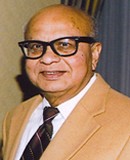|
|
Keynote
Lecture
Energy, Environment and Importance of Power Electronics
|
 |
Prof. Bimal K. Bose
Department of Electrical Engineering and Computer
Science
The University of Tennessee
Knoxville, TN
USA
E-mail: bbose@utk.edu
|
Abstract: Power electronics technology has gained
significant maturity after several decades of dynamic
evolution of power semiconductor devices, converters,
PWM techniques, electrical machines, motor drives,
advanced control, and computer simulation techniques.
With the maturing trend of the technology, 21st century
will find tremendous emphasis on power electronics
applications in every corner of industrial, residential,
commercial, transportation, aerospace , military and
electric utility systems. There will be increasing
emphasis on application-oriented R&D in modularization,
modeling, analysis, simulation, design, and experimental
evaluations. Power electronics has now established as a
major discipline in electrical engineering, and is
gradually tending to merge as a high tech frontier
technology with power engineering. In the 21st century,
we expect to see the tremendous impact of power
electronics not only in global industrialization and
efficient energy systems, but also in energy
conservation, renewable energy systems, and
electric/hybrid vehicles. The resulting impact in
mitigating climate change problems due to man-made
environmental problems is expected to be considerable.
There are ambitious predictions that renewable energy
alone with adequate energy storage can supply all the
energy needs of the world, and 90% of the automobiles
will be electric by the end of the century. It appears
that the role of power electronics in our society will
tend to be as important and versatile as computers and
information technology today. In fact, there is trend of
merger of power electronics with computers, information
technology and power engineering in the future “Smart
Grid” to emerge as a complex interdisciplinary
technology.
The presentation will begin with the discussion of
global energy scenario, climate change problems due to
burning of fossil fuels, and the consequences and
remedial measures of global warming problems. The
importance of power electronics relating to energy
saving, renewable energy systems (wind, photovoltaic and
fuel cells), bulk energy storage and electric/hybrid
vehicles will be discussed in detail. The fuel cell and
battery EVs will be compared, and the concept of Smart
Grid will be discussed. Several example applications on
HVDC wind park, FACT system, DTC drive system, axial
flux PM machine EV drive, fuzzy control of wind
generation system and neural network based feedback
signal estimation will be discussed before coming to
conclusion and future scenario of the technology.
Brief Biography of the Speaker:
Bimal K. Bose held the Condra Chair of Excellence
(Endowed Chair Professor) in Power Electronics at the
University of Tennessee, Knoxville since 1987, where he
was responsible for teaching and research program in
power electronics and motor drives. Concurrently, he was
Distinguished Scientist (1989-2000) and Chief Scientist
(1987-1989) of EPRI (Electric Power Research
Institute)-Power Electronics Applications Center for
promoting power electronics in USA. Prior to this, he
was a Research Engineer in the GE Corporate Research and
Development (now GE Global Research Center),
Schenectady, NY for 11 years (1976-1987), an Associate
Professor of Electrical Engineering, Rensselaer
Polytechnic Institute, Troy, NY for five years
(1971-1976), and a faculty member of Bengal Engineering
and Science University for 11 years (1960-1971). He is
specialized in power electronics and motor drives,
specially including power converters, ac drives, PWM
techniques, digital control, electric/hybrid vehicle
drives, renewable energy systems, A-I applications, and
has made many pioneering research contributions in these
areas. He has been a power electronics consultant in
large number of industries. He authored/edited 7 books
in power electronics, holds 21 U.S. Patents for his
inventions, and large number of research publications.
He has given advanced tutorials, keynote addresses and
invited seminars extensively throughout the world. He is
a recipient of IEEE Power Electronics Society Newell
Award (2005), IEEE Millennium Medal (2000), IEEE
Meritorious Achievement Award (1997), IEEE Lamme Medal
(1996), IEEE IAS Outstanding Achievement Award (1993),
IEEE IES Mittelmann Award (1994), IEEE Region 3
Outstanding Engineer Award (1994), GE Silver Patent
Medal (1986), Calcutta University Mouat Gold Medal
(1970), IEEE Fellow (1989) and Life Fellow (1996), and
many other awards for his research accomplishments. The
IEEE Industrial Electronics Society Magazine published a
special issue (June 2009) “Honoring Dr. Bimal Bose and
Celebrating His Contributions in Power Electronics” with
his photo on the cover page. He received B.E. degree in
1956, M.S. degree in 1960 and Ph.D. degree in 1966.
|
|
